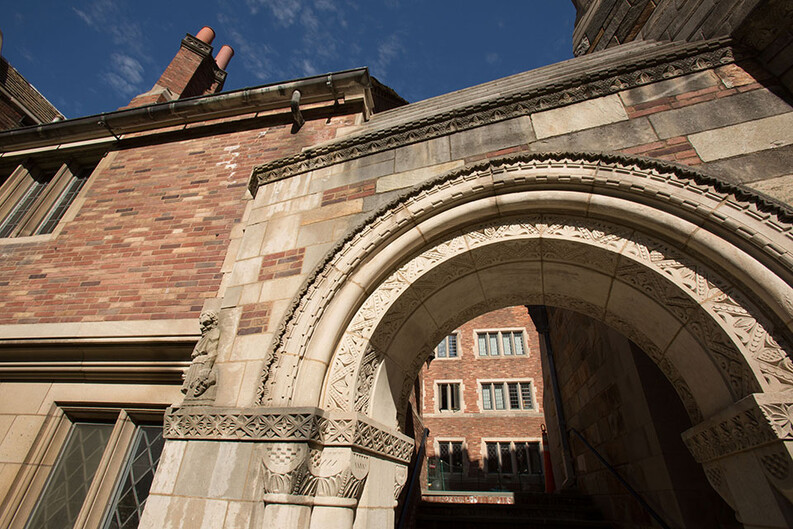Federal Court Cites Rule of Law Clinic Brief in Travel Ban Decision

When the U.S. Court of Appeals for the Ninth Circuit issued a ruling this week against the President’s revised executive order limiting travel from six predominantly Muslim countries, the judges cited an amicus brief from 42 National Security Officials, written by Yale Law School’s Rule of Law Clinic. Clinic clients include former Secretaries of State Madeleine Albright and John Kerry, former Secretary of Defense Leon Panetta, former Secretary of Homeland Security Janet Napolitano, former National Security Adviser Susan Rice, former U.S. Ambassador to the United Nations Samantha Power, several former CIA Directors from both political parties, and the former Republican Chair of the Senate Foreign Relations Committee Richard Lugar.
The court’s decision was one of two recent court of appeals rulings—the other being from the 4th Circuit en banc in IRAP v. Trump— that declared the executive order banning travel from certain countries unlawful. The Clinic’s amicus brief was cited throughout both decisions.
In the new Ninth Circuit ruling, the court cited the clinic’s brief a number of times when discussing the national security implications of the decision. The Trump administration had implemented the controversial executive order citing national security concerns, over the objections of parties and amici that the travel ban oversteps statutory and constitutional authority and discriminates against people based on race and religion.
“Although we recognize that ‘sensitive and weighty interests of national security and foreign affairs’ are implicated, the President must nonetheless exercise his executive power under §1182(f) lawfully,” states the decision.
The Ninth Circuit Judges specifically cited the amicus brief’s argument that the executive order serves no national security interest and actually harms the country’s security.
The Rule of Law Clinic at Yale Law School has been actively involved in challenging the President’s executive order since January, when it first launched by submitting amicus briefs in a number of cases around the country.
Moving to the next stage of this nationwide litigation, the clinic also submitted a new brief this week to the United States Supreme Court opposing the Administration’s challenge to injunctions granted by the Fourth Circuit as well as the District of Hawaii against the travel ban. The clinic is advocating for the Supreme Court to reject the government’s applications to stay the two lower court rulings blocking the executive order from taking effect until the case is resolved.
The clinic’s filing argues that a stay pending review by the Court would be “extremely disruptive to the security of the nation.” The brief goes on to conclude that the Administration’s “continuing inability to identify precisely what pressing national security threat allegedly required the current Order, what changes are purportedly needed to vetting procedures to strengthen our security, or even which version of the Order they want to defend, all counsel this court against rushing to stay the judgment below.”
The Supreme Court could decide on the motion as early as this week.
Sterling Professor of International Law Harold Hongju Koh, who leads the clinic, credited students with coming together on an urgent basis to do such important work. "Our dedicated students working in the national security team of our Rule of Law Clinic did heroic work to get this amicus brief filed in the Ninth Circuit,” said Koh. “Even after they had scattered for the summer, Eri Kalu ’19, Aisha Saad ’18, and Zoe Weinberg ’20 citechecked the brief in far-flung parts of the globe to ensure that we could file on time at the Supreme Court. Their work only confirms that we live in a world where global travel is critical and where we judge individuals by the content of their character, not on stereotypes based on what passports they carry.”
Koh also credited Phil Spector ’00, a Visiting Clinical Lecturer in Law, and pro bono counsel Jonathan Freiman ’98 and Tahlia Townsend ’05 from Wiggin & Dana and Bill Murphy and John Connolly of the Baltimore office of Zuckerman Spaeder, for assisting in putting these critical briefs together. Other clinic instructors include William O. Douglas Professor of Clinical Law Michael Wishnie ’93 and Yale Law School Lecturer Hope Metcalf.
The Rule of Law Clinic focuses on maintaining U.S. rule of law and human rights commitments in four areas: national security, antidiscrimination, climate change, and democracy promotion. In addition to its work on the travel ban cases, the Clinic has also recently worked on issues related to the Administration’s announced withdrawal from the Paris Climate Change Agreement, redistricting, and discrimination against Muslim groups.


